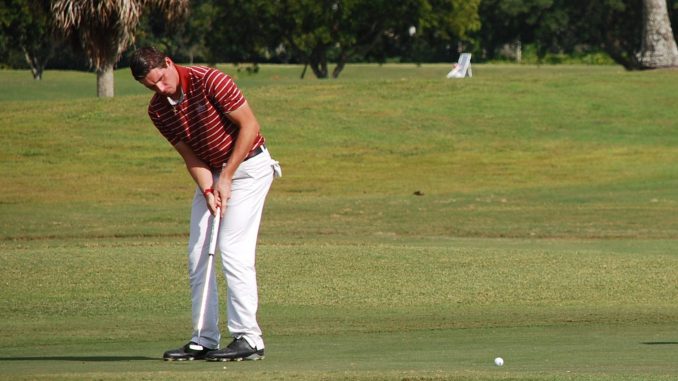
When Temple’s lead golfer Brandon Matthews picked up a golf club for the first time, he had no idea the sport would challenge him mentally as much as physically.
Matthews won the 2014 Dixie Amateur, held in Florida, by a five-shot win in December. He has played in dozens of tournaments – almost 30 a year, if not more, he said.
His experience with the sport has shown him it requires significant mental exercise – more so, he believes, than any other sport.
“From my [psychology] classes, I just combine and take all of the techniques and try to relate them in a way that I can apply them to the golf course,” Matthews said. “My courses teach me of ways to handle conflict, how to communicate, facilitate, mediate, etc. I just try to take most of the main ideas and tie them in, in order for them to help the way I go about a round of golf.”
The adult and organizational development major offers team and individual training and development, as well as mediation and alternative dispute resolution management, according to the department’s website.
Matthews said he uses concepts and tools learned in the classroom and applies them to sports.
“It’s the way to communicate with people and deal with people,” Matthews said. “It’s interpersonal communication. I enjoy it because I had a mental coach since I was 15 for golf.”
Matthews said one of his most important techniques involves using the time between rounds, often five or six hours, wisely.
“After or before a shot, the golfer has to look at the positives and throw out the negatives,” he said. “You want to develop almost a short term memory.”
Matthews believes that having an effective “short term memory” helps golfers to forget a bad shot, so they can focus on preparing for the next one.
“You sit there and learn to grow mentally and as a golfer,” he said.
Rich Caruso, Matthews’ “baseball-coach-turned-mental-coach,” helped him learn that psychology can aid in playing golf well.
“When you get to a certain level, almost every golfer has a team,” Matthews said. “This team can consist of anything from a mental coach to a nutritionist.”
Matthews won his first tournament of the season in October and the fifth of his career for the Owls at the 2014 Temple Invitational.
“Every day that I step onto the golf course, there is something that I have learned in a psychological standpoint that helps me,” Matthews said. “Whether it’s in the big picture of the whole round or just a specific shot. There is always something that I incorporate that helps me succeed.”
Matthews has practiced near professional golfers like Tiger Woods, who he thinks is one of the most “mentally strong” golfers in the game, and even had the chance to play with PGA Tour Professional Sean O’Hair.
The 6-foot-4 golfer plans on playing professionally after he graduates in May 2016.
Matthews said one lesson he took away from his psychology courses has benefitted him most throughout his time as a golfer.
“I’ve learned that the more you tell yourself something, the more your mind will believe it, and it will come true,” Matthews said. “The mind is a very powerful thing. So if I can always keep a positive mindset, telling myself positive things and always being the eternal optimist, then good things will happen.”
“If you end up going to the negative side of the spectrum, being a pessimist, your game will reflect it,” he added. “So staying positive is the most important thing – not only in golf, but in life.”
Jane Babian can be reached at jane.babian@temple.edu



Be the first to comment